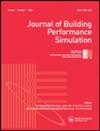On modelling of resiliency events using building performance simulation: a multi-objective approach
IF 2.3
4区 工程技术
Q2 CONSTRUCTION & BUILDING TECHNOLOGY
引用次数: 6
Abstract
Climate change brings several challenges to BPS practitioners beyond GHG emission mitigation. Adaptation to grid-outage events, caused by both acute and chronic stresses, requires consideration of how building services can be provided to occupants in a time of need. At the moment, we lack both the tools and processes to quantify key metrics such as thermal resiliency in tandem with annual performance indicators. This paper proposes a multi-objective approach using thermal resiliency, annual net-energy, and life-cycle cost to better quantify building performance during grid-outages. The approach can handle a variety of events, using shortened simulation periods, and consider cost-implications of outages by applying the value of the lost load to annual operational costs. The methodology is demonstrated using a case-study and a historical grid-outage from an ice-storm event. Resiliency indicators are improved by two times and the payback of upgrade packages is decreased to 14 years for a single outage event.关于使用建筑性能模拟的弹性事件建模:多目标方法
除温室气体减排外,气候变化给BPS从业者带来了若干挑战。适应由急性和慢性压力引起的电网中断事件,需要考虑如何在需要时为居住者提供建筑服务。目前,我们缺乏将热弹性等关键指标与年度绩效指标相结合进行量化的工具和流程。本文提出了一种多目标方法,利用热弹性、年净能源和生命周期成本来更好地量化电网中断期间的建筑性能。该方法可以处理各种事件,使用缩短的模拟周期,并通过将损失负载的价值应用于年度运营成本来考虑中断的成本影响。该方法通过案例研究和冰暴事件造成的历史电网中断进行了演示。弹性指标提高了两倍,升级包的投资回收期缩短至单次停机事件的14年。
本文章由计算机程序翻译,如有差异,请以英文原文为准。
求助全文
约1分钟内获得全文
求助全文
来源期刊

Journal of Building Performance Simulation
CONSTRUCTION & BUILDING TECHNOLOGY-
CiteScore
5.50
自引率
12.00%
发文量
55
审稿时长
12 months
期刊介绍:
The Journal of Building Performance Simulation (JBPS) aims to make a substantial and lasting contribution to the international building community by supporting our authors and the high-quality, original research they submit. The journal also offers a forum for original review papers and researched case studies
We welcome building performance simulation contributions that explore the following topics related to buildings and communities:
-Theoretical aspects related to modelling and simulating the physical processes (thermal, air flow, moisture, lighting, acoustics).
-Theoretical aspects related to modelling and simulating conventional and innovative energy conversion, storage, distribution, and control systems.
-Theoretical aspects related to occupants, weather data, and other boundary conditions.
-Methods and algorithms for optimizing the performance of buildings and communities and the systems which service them, including interaction with the electrical grid.
-Uncertainty, sensitivity analysis, and calibration.
-Methods and algorithms for validating models and for verifying solution methods and tools.
-Development and validation of controls-oriented models that are appropriate for model predictive control and/or automated fault detection and diagnostics.
-Techniques for educating and training tool users.
-Software development techniques and interoperability issues with direct applicability to building performance simulation.
-Case studies involving the application of building performance simulation for any stage of the design, construction, commissioning, operation, or management of buildings and the systems which service them are welcomed if they include validation or aspects that make a novel contribution to the knowledge base.
 求助内容:
求助内容: 应助结果提醒方式:
应助结果提醒方式:


